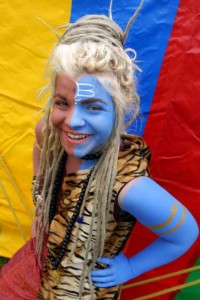BSkyB has pledged that by the end of next year at least 20% of the stars and writers of its UK-originated TV shows will come from a black, Asian or other minority ethnic background. The broadcaster spends £600m a year on original UK commissions such as Stella, Moone Boy and Trollied, and said that the target will apply to all new shows it commissions for its entertainment channels, a Guardian report said.
 The initiative applies to all homegrown programming on Sky1, Sky Atlantic, Sky Living and Sky Arts but not Sky News. BSkyB’s pledge is more stretching than the BBC’s recently announced plans, which include increasing BAME on-screen representation to 15% over a period of three years. The actor and comedian Lenny Henry has criticised the “appalling” percentage of black and Asian people in the creative industries, and has expressed doubts that the BBC’s plans will prove effective, the report said.
The initiative applies to all homegrown programming on Sky1, Sky Atlantic, Sky Living and Sky Arts but not Sky News. BSkyB’s pledge is more stretching than the BBC’s recently announced plans, which include increasing BAME on-screen representation to 15% over a period of three years. The actor and comedian Lenny Henry has criticised the “appalling” percentage of black and Asian people in the creative industries, and has expressed doubts that the BBC’s plans will prove effective, the report said.
“Our aim is to kickstart a sea change in the on-screen representation of ethnic minorities on British television,” said Stuart Murphy, director of Sky’s entertainment channel portfolio. “If the national average is 14% then we should strive for 20% and we should do it very fast. We didn’t want to make a major statement and only do it with one or two shows. This is non-negotiable.”
Under the targets, the broadcaster has plegded that at least 20% of “significant” on-screen roles will go to actors with a BAME background. The initiative will not apply to existing shows where it is not realistic to reverse engineer the format, such as Karl Pilkington’s one-man adventures in An Idiot Abroad. The quota will also apply to the writing teams behind shows – although not when a single writer or a partnership is responsible for an entire series – to help promote a “greater diversity of voices” in Sky programmes and scripts, the report added.
In addition at least one senior production role on each commission will be taken by an executive with a BAME background.
“Often a producer will hire someone who sees the world as they see it,” said Murphy. “If you hire a black executive producer you generally get a mixed team. If you hire a white one you get more of what you already have. Without realising it you end up with an industry full of white men. Making sure it is a senior role means no one can get off the hook”.
Murphy said that BSkyB preferred to adopt the policy of putting BAME staff directly into senior roles, rather than offering special training groups to up skill levels. He cited the example of Sky1 medical drama Critical, which stars Lennie James, where a black female director shadowed the white male director over several episodes and then was “put in at the deep end”, says the report.
“The feedback we got was there are plenty of training schemes and they can be a bit patronising,” he said. “We just want to give people a break.” Henry was critical of the BBC’s plans for training and development programmes for BAME staff. He said that such programmesrisk “blaming the victim” by making BAME people think they have hit a glass ceiling because they are not good enough. Henry recently told a committee of MPs that Britain has been haemorraghing ethnic minority talent to the US for years.
“British actors including Archie Panjabi, who stars in The Good Wife, Idris Elba, Chiwetel Ejiofor and Marianne Jean-Baptiste, and fellow Bend it Like Beckham star Parminder Nagra, who had a leading role in ER, have all had success in the US, Guardian report said.
“We have made sure legally that Sky is open to everyone,” said Murphy. “We are out to make the best TV and we need to redefine what best is. It is slightly potty when you look at the situation we have gotten into. We don’t reflect our customers or their lives. I’m slightly embarrassed I am in a position of relative power as one of the decision makers and things haven’t changed. Targets might not work for everyone, but they do for us. We may not need them in the long term, but for now they are a way of kickstarting the process”.